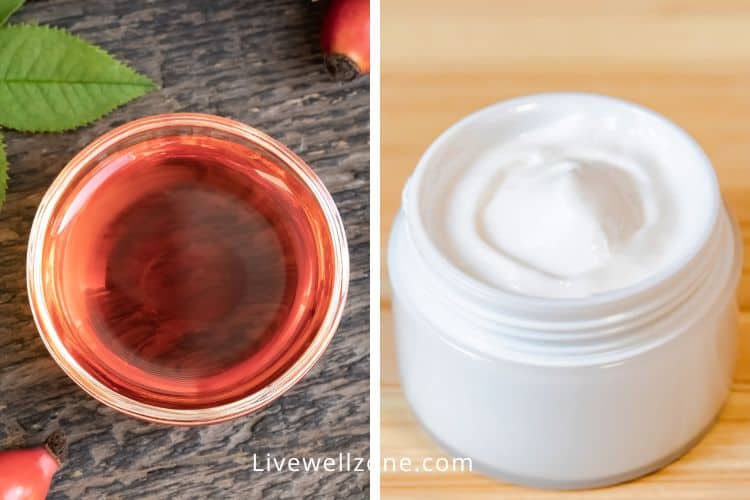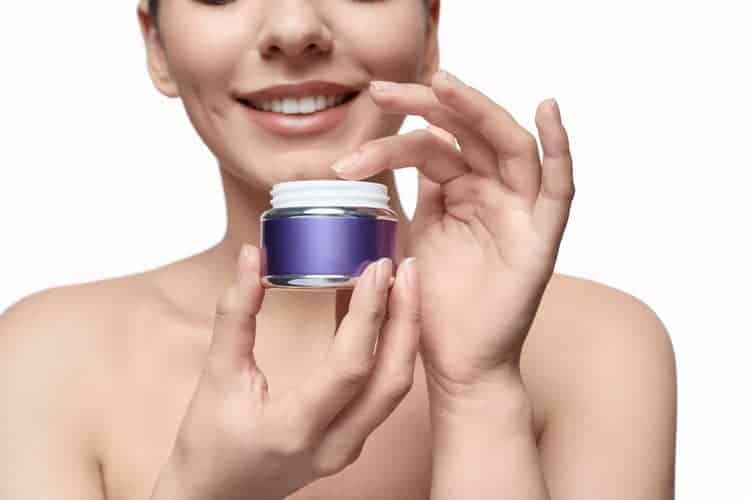
Rosehip oil and retinol are two super popular skincare ingredients that have many benefits in common. But you may still be wondering, which is better: rosehip oil or retinol? Well, in order to answer that question, we must first address one important factor, which is this:
Rosehip oil is a carrier oil that contains beta-carotene (provitamin A), fatty acids and some retinoic acid. On the other hand, the retinol used in skincare products is a synthetic retinoid. Retinol has to be converted to retinoic acid in order for it to be beneficial for the skin.
So, based on the above, the choice of which ingredient is better really boils down to various factors, such as your skin type, what you’re trying to improve and whether and your personal preference (i.e. natural vs synthetic).
To help you figure out which one is best for you, we’re going to discuss:
- The similarities and differences between rosehip oil and retinol.
- Things to consider when using them together.
ROSEHIP OIL VS RETINOL: MAIN BENEFITS AND DIFFERENCES
| ROSEHIP OIL | RETINOL | |
|---|---|---|
| Supports skin barrier function | ✓ | |
| Contains additional antioxidants (such as vitamin E and carotenoids) | ✓ | |
| Supports collagen production and cell turnover | ✓ | ✓ |
| Improves hyperpigmentation | ✓ | ✓ |
| Helpful for acne | ✓ | ✓ |
| Can be used daily | ✓ | |
| Improves wrinkles and fine lines | ✓ | ✓ |
ROSEHIP OIL BENEFITS AND PROPERTIES (1, 2, 3, 4, 5):
- Contains beta-carotene: beta-carotene is part of a group of antioxidants called carotenoids. It also happens to be the most abundant carotenoid in rosehip oil. This is good news for the skin because research suggests that when applied to the skin, beta-carotene is converted to retinyl esters. These retinyl esters are classified as preformed vitamin A (so is retinol, by the way) and they can be used by the body as is.
- Natural source of antioxidants: rosehip oil contains vitamin E which is one of the best antioxidants and emollients for the skin. In addition, there are other carotenoid antioxidants like lycopene, beta-cryptoxanthin, rubixanthin, zeaxanthin and lutein.
- Rich in unsaturated fatty acids: fatty acids have very potent anti-inflammatory properties that make them soothing to inflamed skin. Rosehip happens to contain 40 – 56% linoleic acid (an omega-6), 20 – 30% linolenic acid (an omega-3) and 14 – 20% oleic acid (an omega-9).
- Antioxidant, antimicrobial and anti-inflammatory: some of the antioxidants in rosehip oil – such as phenols – are also known to be antimicrobial. In addition, the high amounts of fatty acids contribute to the oil’s anti-inflammatory properties.
- Supports cell turnover and collagen production: due to its beta-carotene content, which is a provitamin A, rosehip oil supports collagen production and skin renewal. This makes it helpful for things like wrinkles, hyperpigmentation, acne scars and stretch marks.
- Non-greasy: good quality, authentic rosehip oil absorbs well and doesn’t sit on the skin (which makes it less likely to clog pores).
- Supports healthy skin barrier function: since rosehip oil has a significant amount of linoleic acid, it helps to lock in moisture and prevent water loss.
- Gentle enough for under eye: as someone who uses rosehip oil almost daily, I find it quite soothing for the under eye area. It helps to gently brighten and smoothen the delicate skin in that area.
- Can be used daily: As long as you don’t have any allergies to rosehip and rosehip oil agrees with your skin, you can use it daily, be it by itself or in a blend with other carrier oils.
- Ideal for mature and dry skin: although rosehip oil works for most skin types, it can be particularly beneficial for mature and dry skin that needs to be revived.
- May produce results within a few weeks: how long it takes to see results from rosehip oil varies based on what it’s being used for. For example, there’s the case of a Reddit user whose acne got significantly better after 3 weeks of using rosehip oil. But then there are other sources that say it can take six weeks or more to see improvements in scars.
BENEFITS AND PROPERTIES OF RETINOL (6, 7, 8, 9)
- Encourages cell turnover and boosts collagen production: retinol is converted to retinoic acid and as a result, it is able to stimulate the production of both collagen and elastin.
- Balances out skin tone: whether you have hyperpigmentation or dull, uneven skin patches, retinol’s skin renewal properties can help to even things out.
- Reduces wrinkles and fine lines: thanks to the boost of collagen and elastin that comes with using retinol, it’s a popular over-the-counter choice for anyone who wants to reduce the appearance of wrinkles.
- May help acne: retinol is said to unclog pores, a property that could help to reduce acne.
- May be irritating: even though over-the-counter retinol products are less potent than prescription retinoids, they can still be irritating for some people. This irritation can show up in the form of stinging, redness or dryness, for example. As a result doctors often suggest using it every other day or applying it on top of moisturizer to minimize the irritation.
- Takes several months to produce results: since retinol is gentler than prescription retinoids, it might take longer to see serious improvements. In fact, some experts say it can take as much as 4 months or more to get potent results from retinol. To put that in perspective, retinoic acid – which is stronger than retinol – takes about 3 months to produce results. So, definitely practice patience with retinol 🙂
CAN I USE RETINOL AND ROSEHIP OIL TOGETHER?

Since retinol and rosehip oil both encourage cell turnover, it’s generally a good idea not to layer them. Rather, consider using them at different times of the day or on alternate days, so as to minimize the chance of skin irritation.
This is particularly relevant for sensitive skin which is more prone to irritation. So, your routine could look like this:
- Retinol: 1 to 3 times a week, depending on the potency of your retinol product and how your skin reacts to it.
- Rosehip oil: 4 times a week or more.
NOTE: the ultimate deciding factor here is how your skin handles these ingredients. “Sensitive skin” is a broad term and some sensitive skin types can handle small amounts of retinol while others can’t. When in doubt, always check in with your doctor or skincare specialist for customized advice.
FAQs ABOUT ROSEHIP OIL AND RETINOL FOR SKIN
Is retinol natural or synthetic?
Retinol exists both naturally and in synthetic form. For example, the body is able to make retinol from the beta-carotene that we get from foods like eggs and carrots. As for the retinol that is used in skincare products, that is usually a synthetic form.
What can I mix with rosehip oil for my face?
Rosehip oil can be used as a carrier oil for essential oils, as well as with other carrier oils (jojoba and argan, for example), vitamin c serum, clays and other skincare ingredients.
For a complete list and guidelines to help you, be sure to check out this guide on what to mix (and not) with rosehip oil.
What can I use if I can’t use retinol?
Rosehip oil, buriti oil and carrot seed oil (cold pressed, not steam distilled) all contain beta-carotene and can be used to get retinol-like results. For more on these oils, check out this guide on the 8 natural alternatives to retinol that you should consider using.
Can I use rosehip oil everyday?
Rosehip oil can be used in your daily skincare routine, either by itself or in a face oil blend (with other carrier oils). In addition, you can mix it with your regular moisturizer for added skin regeneration properties.
For more on how to add rosehip oil to your skincare routine, check out this guide.
CONCLUSION
Retinol and rosehip oil have many similar benefits when it comes to their ability to act as natural exfoliators (but encouraging renewal of surface skin cells).
However, rosehip oil has one main advantage over retinol: it contains essential fatty acids that play an important role in skin barrier function and isn’t as strong (i.e. irritating) as retinol is for some people.
That said, retinol are often formulated with other hydrating or moisturizing ingredients that can help to offset any potential irritation.
I hope this article has helped you get a better understanding of what rosehip oil and retinol have to offer. If you’d like to learn more about which brands of rosehip oil to use and how to choose a quality oil, be sure to read this article on how to choose the best rosehip oil.
You Might Also Enjoy:
The Difference Between Rosehip Oil and Rosehip Seed Oil: Benefits, Which To Use and How to Use
Radiant Skin Unveiled: Pai Rosehip Oil Review and Insights
A Complete Guide to Retinol vs Aloe Vera (and Why You Should Use Them Together)
Sea Buckthorn Oil vs Rosehip Oil: Benefits, Which is Better and How to Use
Rosehip Oil for Skin: A Complete Guide
Rose Oil vs Rosehip Oil for Skin And Hair: Benefits | Which is Better | How To Use
Aloe Vera vs Hyaluronic Acid: Are They Similar? | How to Add to Skincare Routine
Evening Primrose Oil vs Rosehip Oil: Benefits, Differences, How to Use & Best Brands
Rosehip Oil vs Jojoba Oil for Face (And Body): Which is Better and How To Use
Vitamin C Serum vs Rosehip Oil: Benefits, Which Is Better and How To Use

